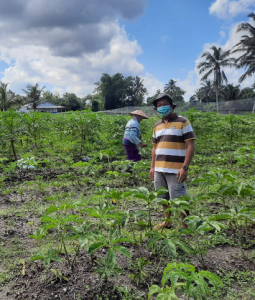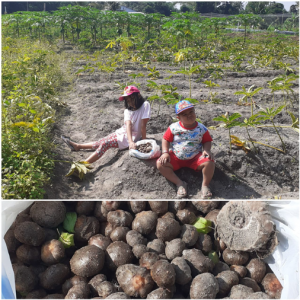By Patrick Farrar
Hermudananto is a doctoral student in the UF/IFAS School of Natural Resources and Environment (SNRE). The international student began the Ph.D. program this spring and soon found himself balancing studies, family, and life during a pandemic back in Indonesia. COVID-19 suddenly made Hermu’s life more challenging, but also more satisfying. He used the opportunity to bring his children to an agricultural field near their home. Hermu taught them a bit about nature and how to properly manage it… while relieving their boredom.

As his courses were all moved online in March, he was luckily able to safely return to his home country of Indonesia before travel became difficult. He is spending the summer with his family, working on his research proposal and collecting preliminary data for his project – improving reduced-impact logging in Indonesia. Balancing everything in his life can be difficult, but he exudes an effortless positivity.
“Being an international graduate student and parent at the same time is challenging, even without the COVID-19 pandemic, but enjoying the current situation is a key to keep moving forward,” he said.
Family Life Meets Science
Hermu, his wife, and his two kids are all working and studying online from home. This can take a toll as boredom, stress, and fatigue set in, both physically and spiritually. However, he did not let that stand in his way.
“I realized that I should keep being adaptive and productive during this uncertain situation, and most importantly stay safe and sane, challenges in the best of times,” he said.

To do so, he took his kids to a small agricultural area near his house. He introduced them to the crops he and his colleagues had planted the year before.
They had planted a crop species locally known as Porang (Amorphophallus onchophyllus) along with papaya trees to shade them. This is a type of intercropping strategy called agroforestry. He taught them that Porang has tubers, enlarged underground structures like potatoes, that are commonly used for food, cosmetics, and even as a water purifier. The tubers can also be processed to make glue and jelly.
Hermu and his children spent a few hours collecting small clove seeds, locally called bulbil, that had fallen from those plants. They also harvested some papayas which he showed them were ripe because of their yellow-orange skin. It seemed like a success.
“I could see my kids’ faces were very cheerful and eager, although their clothes and hands got dirty,” he said.
Hermu’s intrigued children asked questions as they perused the fields. It was proof this field trip had prompted several teachable moments. He had succeeded in starting to teach them a bit about his world and the natural world.
Hermu’s Outlook
Although Hermu could not do his planned fieldwork in Borneo or Papua due to the pandemic, he has pressed on working online from home. Seem less than ideal?
“Maybe, but a done something is better than a perfect nothing, especially during this pandemic,” he said.
For now, he forges on in the ways he can while balancing his family and personal life.
“The most important thing is to stay healthy and happy for me and my family,” he said.
In the fall, Hermu will hopefully board the 26-hour flight from Indonesia to Gainesville. If not, he will continue taking all his classes online from his home country.
 1
1
